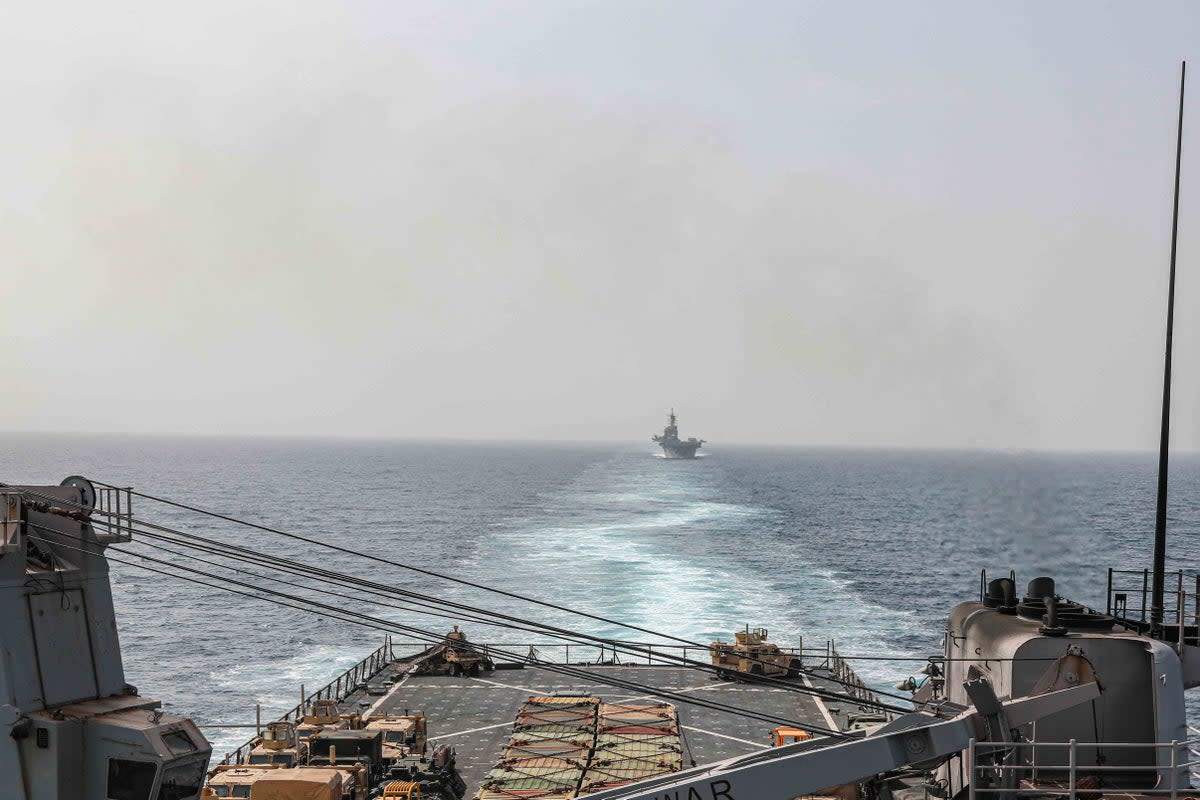Why are Britain and US attacking Yemen’s Iran-backed Houthi rebels?

The US and the UK have carried out military strikes with aircraft, ships and missiles against targets linked to Houthis in Yemen, the White House confirmed.
The attacks took place against the Iran-backed militant group in several Yemeni cities in the early hours of Friday morning, according to an official from the Houthi movement.
“American-Zionist-British aggression against Yemen launches several raids on the capital, Sanaa, Hodeidah governorate, Saada, and Dhamar,” Houthi official Abdul Qader al-Mortada said on X.
The attacks came after the Houthis launched their largest attack on Red Sea shipping in what was the 26th attack since 19 November.
Officials said that 21 missiles and drones were fired at warships and commercial vessels near the Bab al-Mandab Strait, the southern bottleneck of the Red Sea.
The Houthis claim that their assaults on shipping are aimed at stopping Israel’s war on Hamas in the Gaza Strip.
The Independent has compiled everything we know about the past couple of months of Houthi attacks and how they have affected global trade.
Overnight @HMSDiamond alongside US vessels repelled the largest and most complex attack by Houthis in the Red Sea to date.
Nearly 15% of global seaborne trade passes through the Red Sea.
Attacks to commercial shipping jeopardise the movement of goods worldwide. pic.twitter.com/ihOoyK7Hje— Ministry of Defence 🇬🇧 (@DefenceHQ) January 10, 2024
Who are the Houthis and why are they attacking in the Red Sea?
The Houthis are an Iran-backed armed group from a sub-sect of Yemen's Shia Muslim minority, the Zaidis. They take their name from the movement's founder, Hussein al-Houthi. They have been fighting a civil war since 2014 against Yemen's government.
After the Hamas attack of 7 October that killed 1,200 people inside Israel and saw 240 taken hostage and the subsequent Israeli response inside Gaza that health officials in the Hamas-run territory say has killed more than 23,000 pople, the Houthis announced they would target all ships bound for Israel through the Bab al-Mandab Strait. They are part of what Tehran calls an axis of resistance against Israel, the US and the wider West which includes Hamas and Hezbollah from Lebanon.
The Houthis began targeting commercial vessels indiscriminately, triggering the mobilisation of a US-led naval coalition at the end of last year to counter this threat.
Why is the Red Sea important?
It is one of the major waterways for global trade; roughly 12 to 15 per cent of shipping traffic passes through the Red Sea.
Many shipping companies have been forced to reroute their vessels, taking the longer journey around Africa, although several oil majors, refiners and trading houses have continued to use it.
Alternative routes cause delays in supply chains, while increased insurance costs for sailing through the Red Sea threaten to have a knock-on effect to end costs.
Insurance premiums roughly doubled in the wake of the Houthi attacks.
German shipping group Hapag Lloyd said on Tuesday it would continue to avoid the Suez Canal and go around the Cape of Good Hope for security reasons, while its Danish rival Maersk has said it would avoid the route “for the foreseeable future”.
Thus far, spikes in energy prices as a result of the attacks have been short-lived and increased insurance costs have remained manageable, but experts have warned that if a few ships were sunk by a future assault, the situation could worsen.
Could the attack escalate regional tensions?
A spokesperson for the German foreign ministry said the latest Houthi attacks showed the militant group were “clearly focusing on escalation against international merchant shipping”. Before the US and UK airstrikes, British defence secretary Grant Shapps described the situation in the Red Sea as unsustainable and said that the HMS Diamond, the British warship stationed in the area, had been specifically targeted in the latest attack.
The Houthis have vowed to continue their assaults until Israel halts the conflict in Gaza, and warned they would attack US warships if the militia group itself was targeted.
Mohammed al Bukhaiti, a senior Houthi official, wrote on X in December: “Even if America succeeds in mobilising the entire world, our military operations will not stop... no matter the sacrifices it costs us.”
But while the US-led naval coalition remains in the Red Sea, the threat to life and regional escalation remains thin.
The Houthis have no formal naval warships with which to impose a serious blockade of the waterway, while the defence capabilities of the coalition forces are more than able to cope with the threat of drones and missiles.

